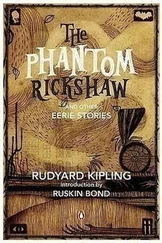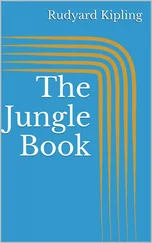Mowgli sat with the head on his knees, careless of anything else, while the remnant of the flying dholes were being overtaken and run down by the merciless lahinis. Little by little the cries died away, and the wolves returned limping, as their wounds stiffened, to take stock of the losses. Fifteen of the Pack, as well as half a dozen lahinis, lay dead by the river, and of the others not one was unmarked. And Mowgli sat through it all till the cold daybreak, when Phao's wet, red muzzle was dropped in his hand, and Mowgli drew back to show the gaunt body of Akela.
"Good hunting!" said Phao, as though Akela were still alive, and then over his bitten shoulder to the others: "Howl, dogs! A Wolf has died to–night!"
But of all the Pack of two hundred fighting dholes, whose boast was that all Jungles were their Jungle, and that no living thing could stand before them, not one returned to the Dekkan to carry that word.
[This is the Song That Chil Sang as the Kites Dropped Down One After Another to the River-bed, When the Great Fight Was Finished. Chil is Good Friends With Everybody, but He is a Cold-blooded Kind of Creature at Heart, Because He Knows That Almost Everybody in the Jungle Comes to Him in the Long Run.]
These were my companions going forth by night—
( For Chil! Look you, for Chil! )
Now come I to whistle them the ending of the fight.
( Chil! Vanguards of Chil! )
Word they gave me overhead of quarry newly slain,
Word I gave them underfoot of buck upon the plain.
Here's an end of every trail—they shall not speak again!
They that called the hunting–cry—they that followed fast—
( For Chil! Look you, for Chil! )
They that bade the sambhur wheel, and pinned him as he passed—
( Chil! Vanguards of Chil! )
They that lagged behind the scent—they that ran before,
They that shunned the level horn—they that overbore.
Here's an end of every trail—they shall not follow more.
These were my companions. Pity 'twas they died!
( For Chil! Look you, for Chil! )
Now come I to comfort them that knew them in their pride.
( Chil! Vanguards of Chil! )
Tattered flank and sunken eye, open mouth and red,
Locked and lank and lone they lie, the dead upon their dead.
Here's an end of every trail—and here my hosts are fed!
Man goes to Man! Cry the challenge through the Jungle!
He that was our Brother goes away.
Hear, now, and judge, O ye People of the Jungle,—
Answer, who shall turn him—who shall stay?
Man goes to Man! He is weeping in the Jungle:
He that was our Brother sorrows sore!
Man goes to Man! (Oh, we loved him in the Jungle!)
To the Man–Trail where we may not follow more.
The second year after the great fight with Red Dog and the death of Akela, Mowgli must have been nearly seventeen years old. He looked older, for hard exercise, the best of good eating, and baths whenever he felt in the least hot or dusty, had given him strength and growth far beyond his age. He could swing by one hand from a top branch for half an hour at a time, when he had occasion to look along the tree–roads. He could stop a young buck in mid–gallop and throw him sideways by the head. He could even jerk over the big, blue wild boars that lived in the Marshes of the North. The Jungle People who used to fear him for his wits feared him now for his strength, and when he moved quietly on his own affairs the mere whisper of his coming cleared the wood–paths. And yet the look in his eyes was always gentle. Even when he fought, his eyes never blazed as Bagheera's did. They only grew more and more interested and excited; and that was one of the things that Bagheera himself did not understand.
He asked Mowgli about it, and the boy laughed and said: "When I miss the kill I am angry. When I must go empty for two days I am very angry. Do not my eyes talk then?"
"The mouth is angry," said Bagheera, "but the eyes say nothing. Hunting, eating, or swimming, it is all one—like a stone in wet or dry weather." Mowgli looked at him lazily from under his long eyelashes, and, as usual, the panther's head dropped. Bagheera knew his master.
They were lying out far up the side of a hill overlooking the Waingunga, and the morning mist hung below them in bands of white and green. As the sun rose it changed into bubbling seas of red gold, churned off, and let the low rays stripe the dried grass on which Mowgli and Bagheera were resting. It was the end of the cold weather, the leaves and the trees looked worn and faded, and there was a dry, ticking rustle everywhere when the wind blew. A little leaf tap–tap–tapped furiously against a twig, as a single leaf caught in a current will. It roused Bagheera, for he snuffed the morning air with a deep, hollow cough, threw himself on his back, and struck with his fore–paws at the nodding leaf above.
"The year turns," he said. "The Jungle goes forward. The Time of New Talk is near. That leaf knows. It is very good."
"The grass is dry," Mowgli answered, pulling up a tuft. "Even Eye–of–the–Spring [that is a little trumpet–shaped, waxy red flower that runs in and out among the grasses]—even Eye–of–the Spring is shut, and … Bagheera, is it well for the Black Panther so to lie on his back and beat with his paws in the air, as though he were the tree–cat?"
"Aowh?" said Bagheera. He seemed to be thinking of other things.
"I say, is it well for the Black Panther so to mouth and cough, and howl and roll? Remember, we be the Masters of the Jungle, thou and I."
"Indeed, yes: I hear, Man–cub." Bagheera rolled over hurriedly and sat up, the dust on his ragged, black flanks. (He was just casting his winter coat.) "We be surely the Masters of the Jungle! Who is so strong as Mowgli? Who so wise?" There was a curious drawl in the voice that made Mowgli turn to see whether by any chance the Black Panther were making fun of him, for the Jungle is full of words that sound like one thing, but mean another. "I said we be beyond question the Masters of the Jungle," Bagheera repeated. "Have I done wrong? I did not know that the Man–cub no longer lay upon the ground. Does he fly, then?"
Mowgli sat with his elbows on his knees, looking out across the valley at the daylight. Somewhere down in the woods below a bird was trying over in a husky, reedy voice the first few notes of his spring song. It was no more than a shadow of the liquid, tumbling call he would be pouring later, but Bagheera heard it.
"I said the Time of New Talk is near," growled the panther, switching his tail.
"I hear," Mowgli answered. "Bagheera, why dost thou shake all over? The sun is warm."
"That is Ferao, the scarlet woodpecker," said Bagheera. " He has not forgotten. Now I, too, must remember my song," and he began purring and crooning to himself, harking back dissatisfied again and again.
"There is no game afoot," said Mowgli.
"Little Brother, are both thine ears stopped? That is no killing–word, but my song that I make ready against the need."
"I had forgotten. I shall know when the Time of New Talk is here, because then thou and the others all run away and leave me alone." Mowgli spoke rather savagely.
"But, indeed, Little Brother," Bagheera began, "we do not always—"
"I say ye do," said Mowgli, shooting out his forefinger angrily. "Ye do run away, and I, who am the Master of the Jungle, must needs walk alone. How was it last season, when I would gather sugar–cane from the fields of a Man–Pack? I sent a runner—I sent thee!—to Hathi, bidding him to come upon such a night and pluck the sweet grass for me with his trunk."
Читать дальше












